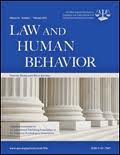Evaluators who purposefully use expressive empathy during a psychopathy assessment interview rate evaluees more favorably than evaluators who purposefully avoid expressive empathy. This is the bottom line of a recently published article in Law and Human Behavior. Below is a summary of the research and findings as well as a translation of this research into practice.

Featured Article | Law and Human Behavior | 2019, Vol. 43, No. 1, 56-68
How Does Evaluator Empathy Impact a Forensic Interview?
Author
Lauren M. Vera, Sam Houston State University
Marcus T. Boccaccini, Sam Houston State University
Kelsey Laxton, Sam Houston State University
Claire Bryson, Sam Houston State University
Charlotte Pennington, Sam Houston State University
Brittany Ridge, Sam Houston State University
Daniel C. Murrie, University of Virginia
Abstract
We used an experimental design to test the key concern that expressive empathy from evaluators during forensic interviews leads to more disclosure of misbehavior (e.g., stealing, breaking the law, manipulating others) from evaluees. In the context of a psychopathy assessment interview, evaluees (N = 94, 100% male, 57.4% Caucasian) interviewed by an evaluator using expressive empathy techniques were no more likely than those interviewed by an evaluator avoiding expressive empathy techniques to admit to past instances of misbehavior (d = .17, 95% CI [-.24, .57]). Instead, the use of expressive empathy techniques seemed to influence evaluator perceptions of the evaluees. Evaluators using expressive empathy rated evaluees as less psychopathic (d = -.52, 95% CI [-.93, -.11]), more conscientious (d = .72, 95% CI [.30, 1.13]), and as having engaged in less impression management (d = -.54, 95% CI [-.95, -.13]) than evaluators avoiding the use of expressive empathy. Put simply, when evaluators expressed empathy, it influenced the evaluator, not the evaluee. These findings suggest the need to expand professional discourse and research on empathy in forensic evaluations to better understand the possible effects of evaluator empathy on both evaluators and evaluees.
Keywords
empathy, forensic assessment, interview style, psychopathy
Summary of the Research
“Clinicians are often encouraged to reflect empathy—verbally and nonverbally—in assessment and treatment sessions. This practice is supposed to encourage respect, understanding, and rapport between clinician and client. There is, however, considerable debate as to the appropriateness of empathic expressions from evaluators conducting forensic evaluations. Although forensic evaluators are required to inform evaluees about the purpose of the evaluation and limits of confidentiality, an evaluator who expresses empathy might inadvertently lead a defendant to believe that the evaluator is pursuing the defendant’s best interests, as opposed to the interests of defense counsel, the court, or the prosecution. Of particular concern is the possibility that forensic evaluator empathy will lead defendants to reveal potentially prejudicial or disadvantageous information about themselves (e.g., previously unreported criminal behavior, negative attitudes or experiences) and their legal cases. Using more colorful terms, the concern is that evaluators might use empathy as a ‘seductive power’ to create a false sense of therapeutic alliance and ‘induce an inappropriate level of trust in an evaluee’” (p. 56).
“Concerns about the potential misuse of empathy by forensic evaluators have become so well known that many authorities raise the issue of evaluator empathy in forensic evaluation textbooks and manuals. Arguments against the use of empathy typically focus on problems associated with outward expressions of empathy, such as using verbal statements (e.g., ‘That’s understandable,’ ‘It sounds like you felt sad/scared/upset’) and nonverbal behaviors (e.g., head nod, reciprocal facial expression) to communicate a sense of shared understanding or felt awareness We refer to this type of empathy as expressive empathy, although others have referred to it as reflective or therapeutic empathy. The original and strongest argument against using expressive empathy comes from Shuman (1993), who takes the position that the use of expressive empathy is ‘unfair’ and ‘presents a bright ethical line that the ethical examiner should not cross’ because it ‘erroneously implies a therapeutic alliance’” (p. 56-57).
“There appears to be less concern that receptive empathy is problematic for forensic evaluators. Receptive empathy is the mental exercise of attempting to take the evaluee’s perspective. In other words, the attempt to accurately perceive and understand the evaluee’s experiences, thoughts, and emotions. Whereas expressive empathy refers to the evaluator’s outward behavior, receptive empathy refers to an internal process that need not be communicated to the evaluee. Some experts argue that receptive empathy is an inherent piece of conceptualizing another’s mental health problems for the purposes of a forensic evaluation. Even those who take the position that expressive empathy is problematic agree that ‘empathic understanding’ is an important component of forensic assessment” (p. 57).
“The overall goal of the study was to examine whether evaluator empathy would impact the assessment in the ways that those concerned about the use of expressive empathy have warned. If these concerns are accurate, those interviewed by an evaluator using expressive empathy will report higher levels of alliance with the evaluator, engage in less impression management, and be more willing to admit to past instances of misbehavior. Because of this increased disclosure, evaluators who use expressive empathy should rate evaluees as more psychopathic than evaluators who do not use expressive empathy. Arguments against the use of expressive empathy do not focus on the possible effects of using expressive empathy on evaluator accuracy. But if those interviewed by an evaluator using expressive empathy are indeed more open and engage in less impression management than those interviewed by an evaluator avoiding expressive empathy, personality trait ratings assigned by evaluators using expressive empathy should more closely correspond with evaluees’ preinterview self-ratings (i.e., their ratings should be more accurate because evaluees were more open during the interview)” (p. 57).
“The mere possibility that the use of expressive empathy by forensic evaluators might encourage excessive disclosure among evaluees has been concerning enough to drive more than 25 years of professional discourse. Although there are many opinions about the potential misuse of empathy in forensic assessment, and many recommendations from authorities, few empirical studies inform the evaluator-empathy debate. We designed an experiment to test the key concern that expressive empathy from evaluators leads to more disclosure from evaluees, but we found no evidence of the type of increased disclosure about which critics of evaluator empathy have warned” (pg. 64).
“These findings do not mean that the use of expressive empathy had no impact on the evaluation. Differences in evaluator empathy were evident to clinical psychology doctoral student observers during pilot testing and to evaluees during the clinical interviews. Thus, our findings suggest that those arguing for limited empathy in forensic evaluation (e.g., Shuman, 1993) are probably correct in assuming that evaluees feel a stronger sense of compassion, cooperation, and understanding from evaluators using expressive empathy techniques. Our findings simply suggest that this sense of alliance does not necessarily affect evaluee disclosure of antisocial traits and misbehavior” (p. 64).
“The most striking finding of this study was that expressing (or avoiding) empathy seemed to influence evaluator perceptions of the evaluees. Although all four of the evaluators conducted both high-empathy and low-empathy interviews, they rated evaluees as less psychopathic, more conscientious, and more honest (less impression management) after they had conducted interviews using expressive empathy techniques. One way to interpret these findings is that the instruction to use more expressive empathy (offering empathic statements) during the interview may have led to an unintended increase in receptive empathy (taking the evaluee’s perspective)” (p. 64).
Translating Research into Practice
“Although there is already some limited evidence that evaluator traits such as agreeableness and attitudes toward sexual offenders are associated with their assessment results across cases, the current study shows that the same evaluator can view evaluees differently because of a purposeful decision to conduct the evaluation one way as opposed to another (i.e., use expressive empathy vs. not). Although we experimentally manipulated evaluator empathy in this study, it is possible that other factors might shape the degree of empathy that the same evaluator chooses to expresses in different evaluations. These factors might include offense details (e.g., type of crime, heinousness, victim age, number of victims), the purpose of the evaluation (e.g., risk vs. mitigation), evaluee traits (e.g., agreeableness), or something about the evaluee’s background (e.g., similarities or dissimilarities with the evaluee). Evaluators tendencies to vary their level of empathy might also help to explain why evaluators retained by the defense—who may tend to behave more empathically—view evaluees more favorably than those retained by the prosecution—who may tend to act less empathically” (p. 64).
“These findings suggest the need to expand the discourse on empathy in forensic evaluations to better incorporate the possible effects of expressive empathy on evaluators, not just evaluees. Differences in the use of expressive/receptive empathy may help explain some of the recently documented evaluator differences in forensic assessment, including psychopathy measure scoring and competence to stand trial opinions. In addition to studying the possible role of case, offense, and offender characteristics, researchers should study natural variations in evaluator empathy. An evaluator’s tendency to use or avoid empathy may be attributable to his or her interpersonal styles or forensic training. Those with formal forensic training may be more likely to avoid expressive empathy due to their familiarity with arguments against its use” (p. 64).
“Overall, our findings highlight the need for more research on evaluator empathy. They also underscore a broader theme of recent field research addressing forensic evaluations; that is, that evaluators are not uniform, interchangeable ‘instruments,’ but rather a dynamic component of the evaluation, such that—at least to some extent—the outcome of a forensic mental health evaluation may depend on aspects of the evaluator, not just the evaluee” (p. 65).
Other Interesting Tidbits for Researchers and Clinicians
“Several aspects of our study design limit the conclusions that can be drawn from this experimental study of forensic evaluator empathy, including the use of only male layperson evaluees, female doctoral student evaluators, and the nonstandard use of the PCL:SV. Our design choices were influenced by both the resources available for the study (e.g., uncompensated evaluator time, scheduling availability), and concerns about the potential for harm among actively justice- involved participants (e.g., disclosure of previously undocumented criminal behavior), but they limit the generalizability of our findings…Our forensic evaluators were also less experienced than many practicing forensic evaluators. Our doctoral student evaluators had never practiced independently and there is some evidence that PCL scores from more experienced clinicians outperform those from less experienced graduate-student clinicians. Although meta-analytic findings suggest that the association between clinician experience and judgment accuracy is much weaker than many expect, experienced evaluators might better understand how varying their interviewing style could influence their perceptions of evaluees and be less affected by their decision to use a specific level of expressive empathy” (p. 64-65).
“Perhaps the most important question for future research is whether our findings generalize to other samples of evaluators and other forensic evaluation contexts. Concerns about the nonstandard scoring of the PCL:SV (i.e., no collateral records) are ameliorated to some extent by the finding that PCL:SV ratings were correlated with self report psychopathy measure scores (r _ .35 to .44), but the effects we observed using the PCL:SV are still best interpreted as estimates of psychopathic traits, as opposed to true PCL:SV scores. Without an evaluation process that included records, we do not know whether the experimental manipulation of empathy would also influence the way evaluators perceived information in records, as opposed to information presented solely via evaluee” (p. 65).
Join the Discussion
As always, please join the discussion below if you have thoughts or comments to add!





















